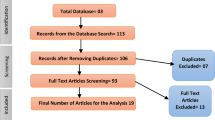Abstract
The present study compares the importance of the characteristics of the rape victims to the characteristics of observers in the attribution of blame in rape cases. Both blame of the victim and blame of the rapist are considered, along with seriousness of the crime, perceived norm violation, respectability, behavioral intentions toward the victim, and behavioral intentions toward the rapist. A factorial design is applied to data collected from 389 college students. Rape is found to be rated serious independently of any factors. Gender relates only to behavioral intentions, while sex-role attitude relates to respectability of the victim, blame of the victim, and blame of the rapist. No substantial statistical interaction effects are found. The findings of the research suggest the need to consider observer characteristics in order to understand the attribution of blame and social perceptions in rape cases.
Similar content being viewed by others
References
Barnett, N. J., & Feild, H. S. Sex differences in university students' attitudes toward rape. College Student Personnel, 1977, 18, 93–96.
Calhoun, L. G., Selby, J. W., & Warring, L. J. Social perception of the victim's causal role in rape: An exploratory examination of four factors. Human Relations, 1976, 29, 517–526.
Feldman-Summers, S., & Lindner, K. Perceptions of victims and defendants in criminal assault cases. Criminal Justice and Behavior, 1976, 3, 135–150.
Feild, H. S. Attitudes toward rape. A comparative analysis of police, rapists, crisis counselors, and citizens. Journal of Personality and Social Psychology, 1978, 36, 156–179.
Heider, F. The psychology of interpersonal relations. New York: Wiley, 1958.
Heider, F. A conversation with Fritz Heider. Pp. 3–18 In J. H. Harvey, W. J. Inckes, & R. F. Kidd (Eds.), New directions in attribution research (Vol. 1). Hillsdale, N.J.: Lawrence Erlbaum, 1976.
Jones, C., & Aronson, E. Attribution of fault to a rape victim as a function of respectability of the victim. Journal of Personality and Social Psychology, 1973, 26, 415–419.
Kahn, A., Gilbert, L. A., Latta, R. M., Deutsch, C., Hagen, R., Hill, M., McCaughey, T., Ryen, A. H., & Wilson, D. W. Attribution of fault to a rape victim as a function of respectability of the victim: A failure to replicate. Representative Research in Social Psychology, 1977, 8, 98–107.
Kanekar, S., & Kolswalla, M. B. Responsibility in relation to respectability. Journal of Social Psychology, 1977, 102, 183–188.
Kelly, H. H. Attribution Theory in Social Psychology. In D. Levine (ed.), Nebraska Symposium on Motivation, 1967. Lincoln: University of Nebraska Press, 1967. Pp. 192–238.
Lerner, M. J. Evaluation of performance as a function of performer's reward and attractiveness. Journal of Personality and Social Psychology, 1965, 1, 355–360.
Lerner, M. J., & Simmons, C. H. Observers' reaction to the “innocent victim”: Compassion or rejection? Journal of Personality and Social Psychology, 1966, 4, 203–210.
Miller, F. D., Smith, E. R., Ferree, M. M., & Taylor, S. E. Predicting perception of victimization. Journal of Applied Social Psychology, 1976, 6, 352–359.
Nie, N. H., Hull, C. H., Jenkins, J. G., Steinbrenner, K., & Bent, D. H. Statistical package for the social sciences (2nd ed.). New York: McGraw-Hill, 1975.
Scroggs, J. R. Penalties for rape as a function of victim provocativeness, damage, and resistance. Journal of Applied Social Psychology, 1976, 6, 360–368.
Shaver, K. G. An introduction to attribution processes. Cambridge, Mass.: Winthrop, 1975.
Snyder, M. Attribution and behavior: Social perception and social causation. Pp. 53–72 In J. H. Harvey, W. J. Inckes, & R. F. Kidd (Eds.), New directions in attribution research (Vol. 1). Hillsdale, N.J.: Lawrence Erlbaum, 1976.
Author information
Authors and Affiliations
Additional information
The authors acknowledge the contribution of Carolyn Morgan and Wilbur Scot to an earlier version of this paper and the contributions of John Edwards and James Michaels to later revisions.
Rights and permissions
About this article
Cite this article
Acock, A.C., Ireland, N.K. Attribution of blame in rape cases: The impact of norm violation, gender, and sex-role attitude. Sex Roles 9, 179–193 (1983). https://doi.org/10.1007/BF00289622
Issue Date:
DOI: https://doi.org/10.1007/BF00289622




